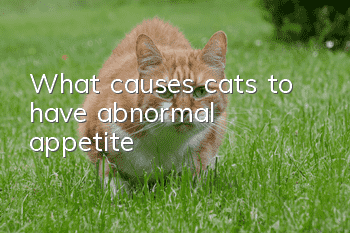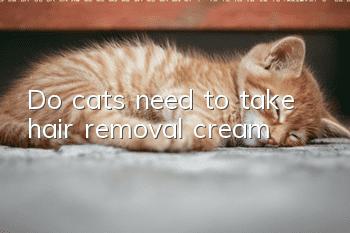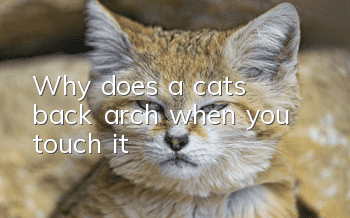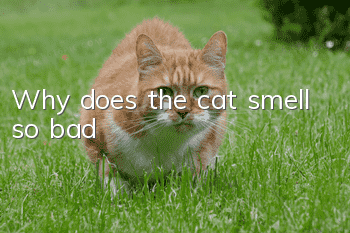What causes cats to have abnormal appetite?

There are many conditions for abnormal appetite, such as sudden anorexia, hyperphagia, food allergies, etc. Cat’s diet is closely related to the cat’s health. If you are not careful, it will cause malnutrition or malnutrition in the cat. Obesity is also likely to be a sign of some diseases, which are all headaches for owners.
1. Cat diet and health
Food diversity has always been a healthy diet for cats advocated by doctors. Of course, cat food must be the main food, because no matter how you do it, the food we prepare will not cover all the nutrients cats need. After all, time and energy are limited unless you have enough patience to challenge. Maybe you will question, since cat food is so nutritionally balanced, isn’t the food we prepare for it tasteless? In fact, this is not necessarily the case. Being able to make food for cats with your own hands and then watching them taste it beautifully can bring satisfaction to the owner, and it is also something that can promote emotional communication between you and the cat. The food we prepare is based on the principle of "high protein, low fat, low purine", and if a cat has only eaten cat food since childhood, such a cat will have a greatly reduced recognition of other foods. On the one hand, , breeding becomes less fun. On the other hand, if such a cat has health problems and has a loss of appetite, it is almost impossible for you to arouse its appetite with some food that we think is very delicious. Many times, a cat's picky behavior will torture both itself and its owner, so if you have the conditions, you can try to train your baby to be a "foodie".
Train a foodie but don’t overdo it, otherwise the cat will become obese. The owner’s pampering and overfeeding are the main factors causing obesity. Therefore, everyone must understand the following points to properly control the pet’s weight:
1. Feed your pet nutritionally balanced food according to its physical condition.
2. Fixed feeding time.
3. Remove uneaten food and do not leave it on the dishes.
4. Feed snacks as little as possible outside the fixed time.
5. Make sure your pet gets enough exercise.
2. Hyperappetite
A cat with a good appetite is always more reassuring and worry-free than a cat with no appetite, but cats are such stubborn animals, so as long as their appetite remains stable, it will be sunny. A sudden strong appetite often represents illness for cats. Of course, the illness here is not just physical, it may also be psychological. When a cat that usually eats a few grains of cat food suddenly eats up all the edible food, wants to eat more, and even meows around its owner, the ownerYou can observe whether the cat has other abnormalities. Excessive appetite caused by illness usually appears together with other symptoms.
For example, a cat suddenly becomes hyperactive, extremely active, sleepless and does not feel tired, and its sleeping time is significantly reduced; its thirst for food reaches a morbid level, and it continues to eat even after vomiting, or it has diarrhea; its weight suddenly increases. Some cats become lethargic, lose weight, have hardened fur, or often make unusual and chilling sounds after overeating. If the cat shows these symptoms, the owner needs to pay special attention, which means the cat is sick. The cause may be a problem with the body's function, or it may be external stimulation that causes the cat's emotional problems, or it may be the owner's misguidance that causes the cat's thinking pattern to change, leading to overeating and other illnesses.
1. Physiological condition
After recognizing the owner as "one of their own", they will also hope to treat the other person better, or do some small actions to make the other person happy. From the perspective of humans, these appropriately distributed "benefits" are very important to them. It’s all that I can express with my best effort. Some cats will choose to take the initiative to get close to their owners, rubbing their heads against their owners, or licking their owners with their barbed tongues. Some cats are more honest and honest and express their gratitude or intimacy to their owners by eating up all the food. . This may happen when the cat accidentally eats all the food, and the owner praises or encourages them, making them think that "as long as they eat all the food, the owner will be happy", which will "eliminate the food in front of them" and " The two things were related, and the impression was strengthened by repeated experiments in the future. For the owner, the cat is different from before. It no longer eats slowly and returns leftovers, but eats all the food in one go. That is "obviously" because the cat is hungry and not full yet. Encouraged by the cat's "appetite", many owners will unconsciously add a small handful of cat food to the next feeding to prevent the cat from starving. Caught in such a cycle of forcing the cat to eat more to please the owner and feeding the cat more to prevent it from going hungry, it is the cat who gets hurt in the end. There are also some cats that will eat food without hesitation as long as their owners hand-feed them. This is also for this reason. What's more, they only eat food fed by the owner's hands, no matter how much, but if the owner just puts the food in the cat's food bowl instead of feeding it with their own hands, they will ignore it. In addition, newly adopted stray cats may also suffer from overeating, because they cannot get a stable supply of food when they are strays. They eat once they are full and eat once they are hungry. As soon as there is food, they will swallow it first to prevent future problems due to the failure of the last time to find food. Starving, so when we first lived with humans, we were anxious about food.Worry often causes them to swallow more food than their bodies can handle.
Regardless of the above situation, it can be attributed to the cat’s mental overeating. The main reason for this kind of overeating mainly comes from excessive anxiety about the relationship between itself and its owner, or anxiety about food, which is burdened with a larger burden. Mental stress, thereby harming yourself. Therefore, owners can relieve the cat’s stress through more companionship, care and communication, such as combing the cat at a fixed time every day, conveying care through combing and stroking the hair, giving them a sense of security, and strictly controlling the daily routine. Feeding amount, two-pronged approach to correct the cat’s thinking patterns and eating habits.
2. Pathological causes
Overeating caused by illness is usually accompanied by other abnormalities. Owners can make a judgment by observing or consulting a veterinarian, and provide the cat with the treatment it needs in a timely manner.
For example, if a cat continues to overeat, its activity level increases correspondingly, its energy level is extremely high, and its sleeping time is significantly reduced. Although it eats more than before, its weight is still on the decline, and the cat is very likely to lose weight. You may be suffering from hyperthyroidism. There is no doubt that it is what is known as "hyperthyroidism". Cats with hyperthyroidism will experience significant loss of appetite and listlessness after their spirits are "high" for a period of time, accompanied by dull and dry hair. Don’t underestimate the harm caused by hyperthyroidism to cats. Surveys show that among cats with hyperthyroidism, no more than 2% of cats are diagnosed with thyroid cancer. They must seek medical treatment as soon as possible. The earlier treatment is given, the greater the possibility of recovery.
Some cats’ overeating is caused by hyperadrenocorticism. This disease is often complicated by diabetes. Most of the affected cats are middle-aged and elderly cats over 5 years old. In addition to having an excited appetite, cats will also experience symptoms of drinking a lot of water and frequent urination, which also require timely medical attention and early treatment.
3. Anorexia and food refusal
Anorexia is likely to be one of the common symptoms of certain diseases, such as gastrointestinal diseases, heart disease, respiratory diseases, tumor diseases, oral ulcers, gingivitis, inflammation of certain parts or organs, urinary system Diseases like kidney failure, stones, liver disease, pain, etc. At the same time, anorexia may also be caused by some non-disease factors. For example, the cat may be anorexic when it is in heat, or the food you give it is really unpalatable, and it is occasionally in a bad mood (note that cats also have bad moods sometimes), familiar Factors such as changes in living environment. Therefore, if you just tell the doctor that your cat has recently become anorexic and does not eat well, it will be difficult for the doctor to know the cause of the cat's anorexia.
As owners, what should we do when we find that our cat is anorexic? The first thing we need to do is to observe your cat’s performance more closely to see if there are any other symptoms or conditions besides anorexia, such as whether the cat is in estrus. ?The cat’s mental stateIs the cat in good condition? If the cat is in heat and in good spirits, there is no need to rush to see a doctor, because they are just not in the mood to eat or are picky. Secondly, if the cat has other symptoms besides anorexia, such as vomiting, diarrhea, poor energy, etc., or the cat has been anorexic for more than 3 days, then you need to contact the doctor quickly to take him for a check-up.
What should I do if my cat refuses to eat pet food? Picky eaters are often a common problem for livestock owners. They always like to eat human food and refuse commercialized food. Taste is often the main factor that determines whether pets eat or not eat food, especially in cats, who usually only eat food that they can smell. Similarly, many respiratory diseases can cause them to lose their sense of smell and appetite at the same time, such as feline rhinotracheitis (FVR). Decreased appetite often occurs when animals have psychological problems, such as anxiety, depression, and long distance travel. For example, animals may lose their appetite when being boarded in a hospital, hotel or pet shop, or when they are suddenly separated from their companions. If your pet has not eaten for more than 48 hours, you must consult your veterinarian. It may be necessary to give them some anxiety-reducing drugs and appetite-stimulating drugs. Sometimes, if an animal encounters an unpleasant eating experience, it will also cause the pet to have a psychological disorder of refusing to eat, such as being attacked by a ferocious similar animal. On the contrary, your pet's appetite may also be improved by your encouragement and praise, such as the owner's company.
4. Food allergies
Food allergy Certain foods can cause allergies or intolerances in pets, and pets may show symptoms such as skin rashes, itching, hair loss, and digestive tract diseases such as vomiting and diarrhea. In addition, many foods are more likely to cause behavioral changes in animals, such as excessive calmness or agitation. However, the allergens most likely to cause these phenomena may be proteins.
When a cat’s food allergy is discovered, what should you do
① Immediately stop feeding the food that causes allergies.
② Take diphenhydramine or chlorpheniramine orally.
③ Oral or intramuscular injection of dexamethasone.
Owners should always observe the cat’s feeding and post-feeding conditions. If the cat is found to be allergic to a certain food, he should stop feeding that food in time and switch to other foods.
- How many days does it take for a kitten to be full moon?
- What should I do if my newly bought cat won’t eat?
- Cats with cat plague start drinking a lot of water and not eating
- The cat has no appetite after taking a bath. The cat’s appetite is much worse after taking a bath.
- 2 ways to feed your cat medicine
- Why can’t cats move their necks and become more obedient after being scratched?
- What's wrong with bleeding from a cat's ear?
- Will a cat that gets stuck in a fishbone heal on its own?
- How to teach a cat a lesson when it makes a mistake? Can a cat be spanked when it makes a mistake?
- What to do if your cat’s gums bleed? How to treat cat gingivitis!



